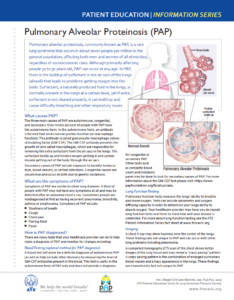What is Pulmonary Alveolar Proteinosis (PAP)
Pulmonary alveolar proteinosis, commonly known as PAP, is a rare lung syndrome that occurs in about seven people per million in the general population, affecting both men and women of all ethnicities, regardless of socioeconomic class. Although primarily affecting people 30 to 50 years old, PAP can occur at any age. In PAP, there is the buildup of surfactant in the air sacs of the lungs (alveoli) that leads to problems getting oxygen into the body. Surfactant, a naturally produced fluid in the lungs, is normally present in the lungs at a certain level, yet if extra surfactant is not cleared properly, it can build up and cause difficulty breathing and other respiratory issues.
The three main causes of PAP are autoimmune, congenital, and secondary. Over ninety percent of people with PAP have the autoimmune form. In the autoimmune form, an antibody is formed that limits normal protein function (or macrophage function). This antibody is called granulocyte-macrophage colonystimulating factor (GM-CSF). The GM-CSF antibody prevents the growth of cells called macrophages, which are responsible for removing the extra surfactant from the air sacs in the lungs. The surfactant builds up and hinders oxygen getting in and carbon dioxide getting out of the body through the air sacs.
This information is provided by the American Thoracic Society.

Looking for more information?
Many of our partner organizations specialize in support for specific autoimmune diseases and have additional resources, research and care-management information available.